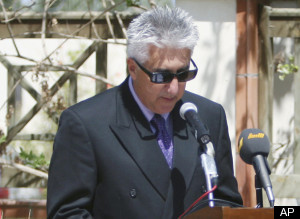I did not name him but others did. ‘He’ is Malaysia’s Cabinet minister who allegedly raped his Indonesian maid 3 years ago. He is a lawyer by profession and obtained his PhD from King’s College London.
In 2007 Malaysia nominated its Minister of Culture, Arts and Heritage to replace the outgoing Commonwealth secretary-general, Don McKinnon, whose term would have expired in March 2008.
This minister was a strong contender for the post having once served as Foreign Minister. There had never been a secretary–general from Asia before and a Malaysian ‘victory’ was imminent. Countries in the region – Singapore, Brunei and New Zealand, also supported Malaysia’s bid.
Malaysia’s High Commission in London where the Commonwealth secretariat is based was geared up to lobby support for its candidate. Visiting Commonwealth heads of state were ready to meet this man. As part of Malaysian’s campaign, the candidate even planned a visit to London to rally support.
Then out of the blue, the nominee dropped his bombshell.
The strange thing was that hours earlier, he had been discussing the Malaysian campaign strategy with Foreign Minister Syed Hamid Albar at a Cabinet meeting.
The nominee’s announcement to withdraw from the race apparently shocked the Cabinet and stunned the government.
So what happened in those crucial hours from the time he finished discussing his campaign, to the time he made his personal announcement? Who did this man speak to? More importantly, who had contacted him? What was discussed that ‘persuaded’ him to withdraw his candidacy?
The proper procedure would have been for the government to announce any changes in the Malaysian Commonwealth bid. But this man did not, or could not wait.
Why?
Was he given an ultimatum or was he told that that was the best solution for all?
The reasons he gave in his sudden announcement was that he had ‘pressing duties to oversee celebrations of Malaysia's 50th year of independence’.
He said, “My responsibilities (for the Merdeka celebrations) are far more important and furthermore, it is already too late (to campaign). So it's better that I withdraw”.
Noble words indeed but they only added to intense speculation that something had cropped up that was being swept under the carpet.
Wikileaks and other cyber whispers have edged us closer to the truth and finally, the last piece of the puzzle provides us with a clue and answers those questions that were asked in 2007.
This man was allegedly accused of rape. The Prime minister at the time, Abdullah Ahmad Badawi and his deputy, Najib Abdul Razak were privy to this distasteful revelation.
But true to fashion, they had to protect the ‘good name’ of Umno. And themselves.
The matter was serious enough and could have brought down a government, but no investigation was carried out to see if there was any truth in the allegation.
Perhaps, senior members of Umno already know that there are several rapists, murderers and psychopaths making up their ranks.
Justice for the rape victim was the last thing on the collective minds of these men. What mattered most was to protect Umno.
The leaders knew that under normal circumstances, the alleged rapist could have carried on with his job and play an important role in society, like nothing had happened. This is Malaysia, after all, where whitewashing is a favourite pastime.
The fact that this man had put his name up for nomination for the post of Commonwealth secretary-general complicated matters. The fact that Malaysia’s bid was going to be successful did not help.
If this man was selected as Secretary-General of the Commonwealth that March 2008 he would have to be based in London.
If the girl who was raped managed to successfully press charges or if some stubborn journalist got wind of the story and unearthed the sordid details, this man’s past and his crime, would have been exposed.
Scotland Yard or Interpol would have had to detain him and carry out investigations. The Commonwealth, Malaysia and Indonesia would have a diplomatic scandal of cataclysmic proportions. Our name would be “mud”.
So Abdullah Badawi and Najib did the next best thing. They persuaded the candidate to withdraw his nomination and blame it on “personal matters”. That way it would not tarnish the administration. They too, played their part and professed ‘shock’ at his ‘sudden’ announcement.
They must have told the alleged rapist that although they could easily protect him in Malaysia, their power and influence could not extend to the United Kingdom where the rule of law is adhered to.
But for Wikileaks and the cyberwhispers, all these rape allegations have blown out into the open.
This is the same minister who, in early 2010, warned Muslims to not immerse themselves in the Internet and told Malaysians that “….Twitter and Facebook are tools of the West that can erode Malaysian culture…”
No wonder he told us to be wary of the Internet. How ironic then that in the end it was the internet that brought about his downfall.
WASHINGTON — In what appears to be the first diplomatic casualty from the latest WikiLeaks revelations, the U.S. ambassador to Libya has returned to Washington and is likely to leave his post, U.S. officials said TuesdayAmbassador Gene Cretz, a veteran American diplomat, authored several secret cables to Washington that speculated on long-time Libyan leader Moammar Gadhafi's health, and described his personal proclivities, including his reliance on a "voluptuous" Ukrainian nurse




No comments:
Post a Comment